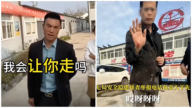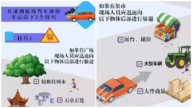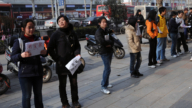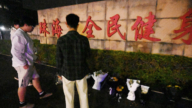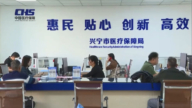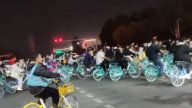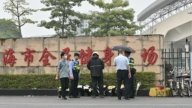【新唐人2013年01月09日訊】《南方週末》抗議閹割新年獻詞的事件,從編輯部員工擴展到全中國社會,從網絡呼籲延燒到街頭抗議。週一到週二,成百上千的市民聚集到報社外面,呼喚言論自由和新聞自由,形成自1989年以來,第一次以「民主政治」為訴求的集會。
週一開始,廣州市民自發來到《南方週末》報社外面,聲援《南周》編輯部員工反對新聞審查的行動。他們手持黃菊花或小紙牌,發表演講,最多時人數達到上千人。廣州自由作家野渡參加了集會,他說,昨天的現場氣氛相當的熱烈。
廣州自由作家野渡:「因為你知道在中國八九年以後,民眾的激烈抗議基本上都是跟私人利益有關,像徵地,拆遷,環保等,但像這樣的政治議題,這樣的詞彙,是八九年後第一次,而且在場人反應那麼熱烈,真的是看到人心思變。」
而在《南周》內部,編輯團隊和管理高層之間正在進行激烈博弈。 1月6號晚間,《南方週末》官方微博發佈聲明,指說引發「南周事件」的新年特刊封面導言,是由報社負責人草擬,不是早前媒體人傳出的是廣東省委宣傳部部長庹震操刀。而新年獻詞是報社編輯配合專題撰寫,網上有關傳言不實。
這項聲明發佈後,網絡一片嘩然,「南方週末新聞職業倫理委員會」1月7號凌晨兩點半發表聲明說,管理高層發佈的聲明極度扭曲事實,有理由懷疑這是省宣傳部相關人士內外配合佈局,企圖擾亂輿論的行徑。
一位匿名的前南方報業集團編輯表示,採編團隊正在跟高層對話。
前南方報業編輯:「據說南方報昨天有人談判了,南方週末採編這一批人和南方日報和南方週末高層有一個對話。具體結果怎麼樣,我也不知道。」
自十八大中共最高領導人換屆後,人們對中國的憲政改革與新聞自由言論等懷抱希望。但是這次中宣部對《南周》的強硬態度,似乎與「憲政夢」相背離。
原中青報資深編輯李大同:「因為主管意識形態,管宣傳的這個人沒有換,這個人當了一輩子新聞自由的劊子手,現在還是他(劉雲山),而新聞媒體管理議事日程現在還沒有開始,習、李那裏還沒有開始,現在一切都是按照傳統的慣性在走。甚麼敵對勢力啊,這個那個的,可笑之至。」
李大同也表示,習近平還沒有對新聞自由作出表態,他對新聞的態度現在還是一個謎。
「英國廣播公司(BBC)」報導說,中國的憲政改革自1989年「六四民運」後停頓,渴望改革的中國知識份子在被壓抑了二十多年之後,每次新領導人上臺,只要有一點點放鬆和暗示的口徑,許多媒體和知識份子就會發出要求憲政改革和新聞自由的呼聲。
但是《南華早報》北京分社社長黃忠清向BBC表示,對中共新領導人抱有這些期望很幼稚,因為任何改革都會觸及中國共產黨作為一個整體的利益。而中共是保守的、不願改革的,所以即使習近平願意改革,也會面對非常強大的阻力。
黃忠清指出,中國的社會現實已經不允許政治改革無限期的延滯,不改已經無路可走,老百姓和習近平、李克強都意識到了這一點。但是憲政改革需要付出代價,尤其是新聞言論的自由,因為即使最開放的領導人,為了自己階層的利益,也會盡力壓制可能損害他們利益的新聞自由。
報導說,《炎黃春秋》與《南方週末》事件暴露了習、李政權並不會像公眾此前預期的那樣推動政治改革和民主進程。但黃忠清認為,目前還不能判斷這是廣東或北京政府,或是地方宣傳部門的個別行為,還是,中共當局對新聞輿論加強的新一輪整體控制。他說,如果各地持續出現類似事件,才能顯示這一屆政府的改革誠意,也只停留在口號上。
採訪編輯/秦雪 後製/君卓
Anti-censorship Leads to Democracy Rally on Streets
The Southern Weekly’s New Year edition message that was
tampered with leads to the whole Chinese society to protest on streets.
On Monday and Tuesday, hundreds of people gathered outside
to the newspaper agency, including the editorial staff and the network.
Calling for freedom of speech and of the press, the assembly was
the first since 1989, demanding a “democratic system”.
On Monday, people from Guangzhou City spontaneously came
to the Southern Weekly agency to support the “South Weekly”
editorial staff’s action against censorship. They were armed with
yellow chrysanthemum or small placards. They made speeches.
The maximum number of people reached a thousand at times.
Guangzhou freelance writer Ye Du took part in the rally.
He said the atmosphere was quite heart-warming.
[Ye Du, Guangzhou freelance writer]: “Since 1989,
fierce protests of this scale are associated with people’s private interests.
Such as land acquisition, demolition of homes,
and environmental protection etc.
This is the first time to see this kind of political issues and
hear words like these.
People responded so warmly, so you know they are changing."
There has been an ongoing intense struggle between the
Southern Weekly editorial team and senior management.
On Jan. 6th the Southern Weekly official microblog
issued a statement saying that
its New Year special edition cover was drafted by the agency,
but not Tuo Zhen, the Propaganda Minister.
The New Year Message was written by the newspaper editor.
After this announcement, there was an uproar on the network.
The Southern Weekly News Professional Ethics Committee
issued a statement at 2:30am on January 7.
This said the statement released by the senior management
had extremely distorted the facts.
There is a reason to suspect that someone within the agency
cooperated with the Provincial Propaganda Department.
This was an attempt to disrupt public opinion.
An anonymous former Southern Newspaper Group Editor said
the editorial team is engaging in a dialogue with higher levels.
He said: ”It is said that people from the Southern Weekly
had a dialogue with higher levels yesterday.
However, I do not know the results of that.”
Since the 18th Congress, Chinese people cherished a hope for
both constitutional reform and freedom of speech.
But the hard-liner attitude of the Central Propaganda Department
towards the Southern Weekly seems to run opposite to that hope.”
Original Zhong Qing Bao senior editor Li Datong: “Because
this person in charge of ideology and propaganda has not been
replaced, he has been an executioner of freedom of the press.
He walks the same path until new procedures are implemented.
It is pretty ridiculous mentioning of hostile forces etc.”
Xi Jinping has not made a stand for freedom of the press,
and his attitude towards the media is still a mystery.”
The BBC reported that the constitutional reform in China
has been a standstill since 1989.
Intellectuals in the Mainland will speak loudly
after 20 years of suppression.
When any new leader takes office,
he just shows a little relaxation or hints.
Many media people would call for constitutional reform
and freedom of the press.
However, the Bureau Chief of Beijing South China Morning
Post, Huang Zhongqing told the BBC,
that it is rather naïve to cherish any expectation of
the Party’s new leaders.
Any reform will eventually touch the Party’s interests.
The Chinese Communist Party (CCP) is conservative and unwilling to change.
Even if Xi Jinping wants to bring reform,
he will face very strong resistance.
Huang Zhongqing pointed out that the social reality in China
has not allowed the indefinite delay of political reform.
Without reform, the Party is approaching a dead end.
The public, Xi and Li all recognize that.
Constitutional reform comes at a price,
especially the freedom of speech and freedom of the press.
Even the most open of the leaders will try to suppress
freedom of the press, which might harm their interests.
The report says that the “Yan Huang Spring Autumn “and
Southern Weekly incidents exposed Xi- Li regime.
It does not want to promote political reform as the public
had expected them to.
But Huang Zhongqing cannot be sure whether the propaganda
department of Guangdong or Beijing was behind this incident.
If the CCP wants to strengthen the overall control of the news


